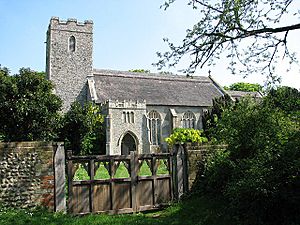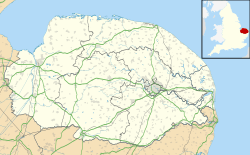St Andrew's Church, Hempstead facts for kids
Quick facts for kids St Andrew, Hempstead |
|
|---|---|

St Andrew's seen from the southwest
|
|
| 52°47′59″N 1°33′49″E / 52.7996°N 1.5637°E | |
| Location | Hempstead, near Stalham, Norfolk |
| Country | England |
| Denomination | Church of England |
| History | |
| Status | parish church |
| Dedication | St Andrew |
| Architecture | |
| Functional status | Active |
| Heritage designation | Grade II* |
| Designated | 16 April 1955 |
| Style | Gothic |
| Years built | 13th–15th centuries |
| Specifications | |
| Materials | flint walls, ashlar quoins, thatched roofs |
| Bells | 3 |
| Tenor bell weight | 9 cwt |
| Administration | |
| Deanery | St Benet at Waxham & Tunstead |
| Diocese | Norwich |
| Province | Canterbury |
St Andrew's Church, Hempstead, is a historic church in Hempstead, near Stalham, Norfolk, England. It is part of the Church of England. Hempstead is a small place located about 7 and a half miles east of North Walsham. It is also only about half a mile from the North Sea coast. This church is very old and has been given a special status as a Grade II* listed building. This means it is an important historical building that needs to be protected.
Contents
Exploring St Andrew's Church History
The church of St Andrew has a long and interesting past. Its oldest part, the chancel, was built way back in the 13th century. Imagine how many years ago that was!
How the Church Changed Over Time
The main part of the church, called the nave, was built in the 14th century. At one point, the nave had extra sections on the sides called aisles. However, these aisles were taken down in the 15th century. Also in the 15th century, a tall tower was added at the west end of the church. A beautiful wooden screen with special designs was also put in the arch leading to the chancel.
The Unique Chancel Screen
The upper part of the chancel screen shows a special kind of Perpendicular Gothic design. It has unusual patterns carved into the wood. The lower part of the screen has two rows, each with eight panels. These panels once held paintings of saints from the 15th century. Most of these old paintings are still there today. Sadly, in February 1982, one painting of Saint Eligius was stolen from the screen and has never been found.
Inside the Church: Pulpit and Bells
The pulpit, where sermons are given, and the reading desk are from the 17th century. This means they are also hundreds of years old!
The west tower of the church holds three bells. Each bell has its own story.
- The second bell was made by someone unknown at the end of the 14th century.
- The largest bell, called the tenor bell, was cast by a company named Brasyers from Norwich at the end of the 15th century.
- The smallest bell, the treble bell, was made by Thomas Newman of Norwich in 1707.
 | Charles R. Drew |
 | Benjamin Banneker |
 | Jane C. Wright |
 | Roger Arliner Young |


